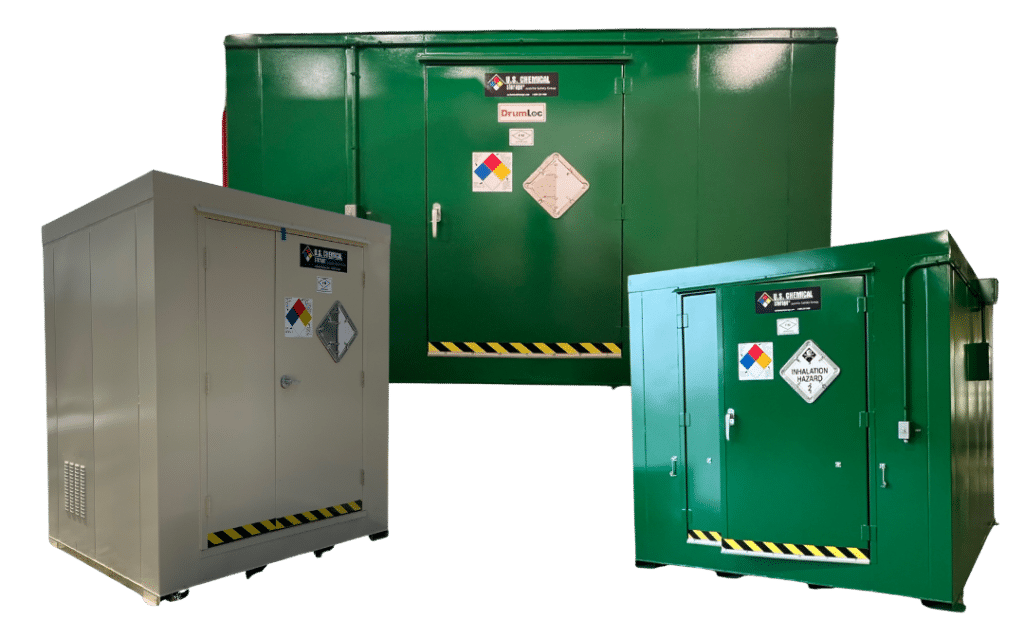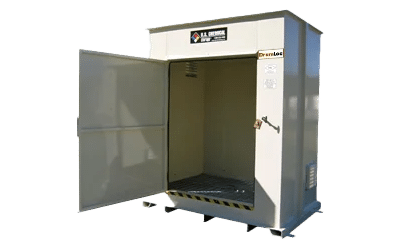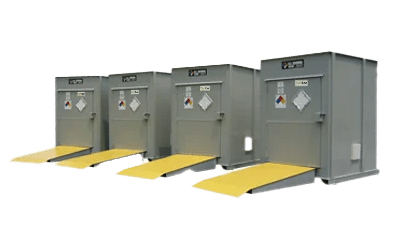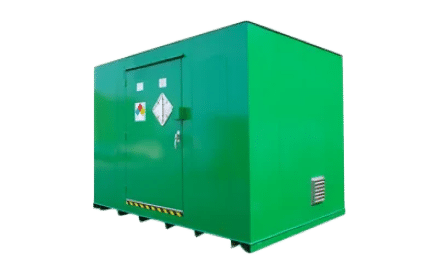Agrochemical Storage
A chemical storage building will significantly reduce any contamination risk to the environment while increasing security of your investment. Storage, mixing, and dispensing are easily achieved safely and efficiently.

U.S. Chemical Storage engineers safe, secure agricultural chemical storage for turf maintenance and agricultural professionals.
Engineered for Agrochemical Solutions
All of our non-fire-rated buildings are professionally manufactured of heavy gauge steel. They are a perfect choice for storing the specialize substances required to manage an agricultural ecosystem for farming operations, golf course turf management, commercial agricultural labs, municipality parks and rec departments, food production operations large and small, and more. Fertilizers, liming and acidifying agents, soil conditioners, pesticides, herbicides, fungicides, fertilizers, as well as other EPA-regulated agricultural chemicals may not require fire rated storage, but ground water protection is of utmost important.
U.S. Chemical Storage TurfLoc™ and DrumLoc™pesticide storage buildings can significantly reduce your risk of contaminating the environment or ground water surrounding your building. Our leak-tested secondary containment sumps have a 15 year structural warranty and offer increased protection in case of a spill or leak.
All buildings are completely customizable* to keep your agrochemicals safe, dry, and secure. Fire-rated construction and modular options are also available, along with optional accessories such as temperature controls, shelving and more.
At U.S. Chemical Storage, we understand the need for keeping your turf and agrichemicals close at hand. By utilizing our specialized agricultural chemical storage buildings your team can maintain efficiency. DrumLoc™ and TurfLoc™ buildings are suitable for the storage, mixing, and dispensing of:
Fertilizers
Both liquid and granular fertilizers are popular to maintain turf in a good condition. Protect your valuable fertilizer by storing it in and agricultural chemical storage building with cool, dry conditions, away from other chemicals such as pesticides. Fertilizer chemicals pose a high risk to ground or surface water in case of a leak or spill. U.S. Chemical Storage provides EPA-compliant options for your fertilizer storage by utilizing our leak-proof sumps with optional sump liner.
Granular fertilizer is often supplied in large bags and commonly used for turf management in late autumn to strengthen the grass for winter, or during growing season prior to harvest on farms. Granular fertilizers are typically stored in large quantities.
Liquid fertilizers contain a combination of nutrient solutions that can separate into layers if stored for long periods of time. Mixing should occur in a well ventilated and controlled space like our TurfLoc™ or DrumLoc™ storage buildings with liquid-tight containment sumps to keep any spills within our 100% steel-welded and leak tested sump.
Herbicides
Herbicides are important products for landscaping and horticulture. Most herbicides are extremely toxic and must be stored with care. Depending on the type of herbicides and the average temperature variances, heated or air-conditioned herbicide storage buildings may be necessary when storing bulk amounts of herbicides onsite.
Protect herbicides by storing away from work areas in a compliant chemical storage building, elevating chemicals with a spill control pallet, accumulation center or shelving, and keeping it locked when not in use. Our built in spill containment satisfies the need to elevate chemical containers above ground level in the case of a spill.
Proper herbicide storage will increase the life of the chemicals and prevent any hazardous leaks or spills. All U.S. Chemical Storage buildings for herbicides include leak-tested secondary containment sumps that meet EPA regulations.
Pesticides
Pesticides must be properly stored to avoid hazards to human health and the environment. Agricultural pesticides are used in many applications, including protecting crops, controlling weeds, insects, and fungi. They are also used for altering the life cycle of harmful pests. Agricultural pesticides are widely used to control threats to agricultural production that can impact the food supply.
Extreme temperatures can change the chemical components of some pesticides, rendering them ineffective. In certain cases, it causes the chemicals to be more harmful to plants, animals, water sources, and people. Temperature-controlled storage helps maintain a compliant storage atmosphere for your inventory. Mechanical ventilation can decrease internal temperatures and help eliminate toxic fumes or dusts that pesticides or other chemicals can give off while being stored or handled.
Good housekeeping practices are important for safely storing pesticides. A dry and completely enclosed pesticide storage building is necessary. Large quantities of pesticide storage can be very dangerous to handle and store, therefore proper security, containment, and maintenance are required.
And many other agrochemicals used by a wide variety of industries!
Be sure to reach out to us with your specific need. In our decades-long experience working with agricultural operations of all sizes, we are sure to help with your need.
“Agrochemical Storage and Safety Procedures”
Features & Benefits
- 100% customizable
- 15-year structural warranty
- Durable, welded steel construction ensures structural integrity
- Acrylic alkyd enamel with an epoxy paint upgrade option available for UV and weathering protection
- Racking and shelving accessible
- EPA compliant, leak-tested spill containment sump
- Multi-room units available
“The Importance of Safe Agricultural Storage”
Frequently Asked Questions
First consult the Safety Data Sheet (SDS) to determine the type of chemical you’re storing and any storage requirements listed. There are two main classifications of buildings to consider: fire-rated and non-fire-rated steel buildings.
There are three main questions you should answer before engineering or design can begin on your building: what is to be stored, how much of it is being stored, and where is the location it will be stored? You will also need to consult with your local “Authority Having Jurisdiction” (AHJ) or local code expert to determine your area’s specific storage building requirements.
Our team at U.S. Chemical Storage has a wealth of knowledge, experience, and resources to help analyze your storage needs, but the final approval is made by the local AHJ, so you will need to ultimately ask them about your requirements early in the planning process.
Chemical storage buildings manufactured by U.S. Chemical Storage are designed to get your operation compliant. Contact one of our technical sales engineers to learn how we can find the best solution for your compliance needs.
You will also want to learn more about specific chemical storage requirements in your specific area by contacting your local “Authority Having Jurisdiction” (AHJ) who could be a local fire marshal, a municipal code official, or a city environmental department.
Start by speaking with one of our experienced Technical Sales Engineers to learn about the needs of your application. They will want to know what type of chemicals you are storing? How much of it will you be storing? What proximity to other buildings, people, egress paths, or environmental features will it need to be? Do you require special spill containment?
And from there they’ll ask any related questions that determine additional options; Material Handling – Climate Control – Ventilation – Occupancy – Lights – Sensors – Alarms – Door Styles – Eyewash Stations and other requirements are not uncommon. Answers to these questions will dictate the building’s fire rating construction as well as anything else you’ll need for proper code compliance.
“The Expectations of Working with U.S. Chemical Storage”
Request a Quote
RELATED PRODUCTS
DrumLoc™ Chemical Drum Storage Buildings
DrumLoc™ is a safe and secure non fire-rated storage building and provides ideal protection for large quantities of hazardous chemicals. Each chemical drum storage building can be outfitted to hold from two to 56 drums and will accept a variety of accessories to make operations flow safely and smoothly. View Product >TurfLoc™ Agri-Chemical Storage Buildings
TurfLoc™ is the ideal non-fire rated chemical storage building for turf maintenance and agricultural professionals. Designed for herbicide, fungicide, and pesticide storage, the flexible design of TurfLoc also makes it suitable for fertilizer and other agrichemicals. View Product >Pre-Engineered Turf Chemical Lockers
Pre-engineered, non-combustible turf chemical lockers promote safe handling and storage practices of agricultural management chemicals. Use these rugged, non-fire-rated lockers to house your chemical pesticides, fertilizers, and more, safely and securely. View Product >
YOUR PARTNER IN THE PROCESS. EXPERIENCE YOU CAN TRUST.
We deliver the precise building solution with the speed, security, and high quality that you demand.




